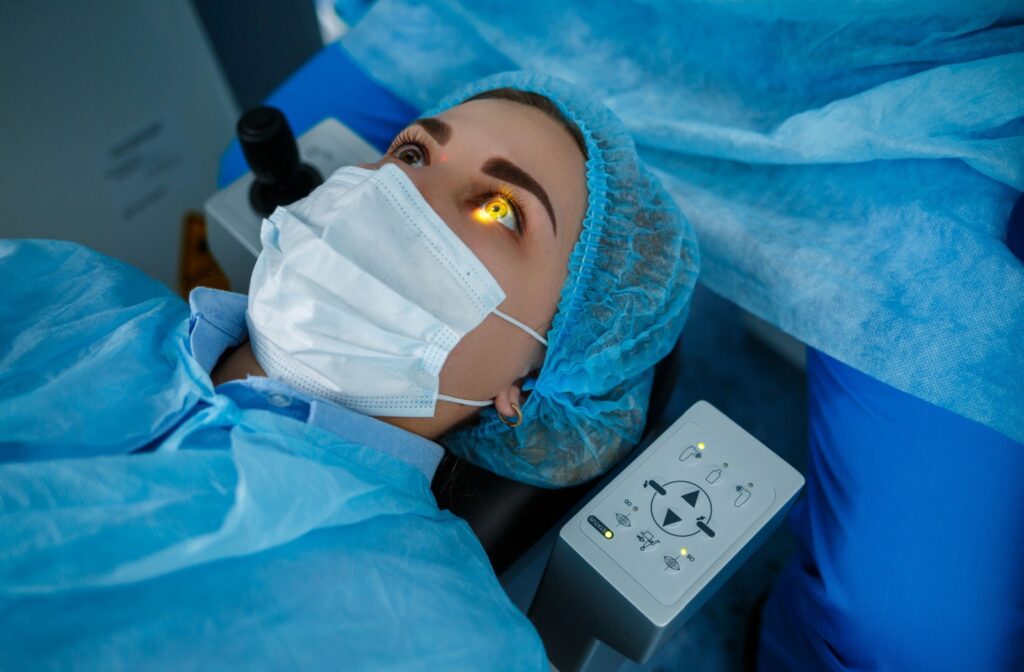LASIK is a popular refractive surgery for vision correction. With a procedure so sought after, many are also interested in understanding the details concerning this process and the estimated cost.
Most insurance providers don’t cover LASIK under their plans because it’s considered an elective surgery. Many LASIK clinics have established payment plans for patients to provide a more budget-friendly financing option for the procedure.
Interested individuals are encouraged to understand the limits of the procedure and their insurance coverage.
Understanding LASIK Surgery
LASIK (Laser-Assisted In Situ Keratomileusis) is a popular refractive eye surgery aimed at correcting vision concerns like myopia (nearsightedness), hyperopia (farsightedness), and astigmatism. LASIK cannot always correct presbyopia as it develops naturally from aging.
The procedure reshapes the cornea to allow light to be correctly focused onto the retina, resulting in clearer vision.
Developed in the 1990s, LASIK has become one of the most common elective surgeries due to its high success rates and quick recovery time. Patients often report significant improvements in their vision, reducing or eliminating the need for glasses or contact lenses.
Many people choose LASIK because it offers a long-term solution to vision correction. Unlike glasses or contact lenses, which require ongoing maintenance and replacement, LASIK provides a more permanent fix. It’s also convenient—imagine waking up and seeing clearly without reaching for your glasses!
The procedure is relatively quick, typically taking less than 30 minutes per eye. Most patients experience improved vision almost immediately and can resume normal activities within a few days.
Does Insurance Cover LASIK?
One of the most common questions is whether insurance plans cover LASIK surgery. In most cases, the answer is no.
LASIK is generally considered an elective or cosmetic procedure, meaning it isn’t deemed medically necessary. Most insurance companies classify it similarly to cosmetic surgeries like facelifts or liposuction.
However, there are exceptions. Some insurance plans offer discounts or special rates for LASIK procedures through partnerships with specific providers.
It’s important to read the details of your insurance policy and consult with your provider to understand if any benefits are available.
Federal Insurance Plans
When it comes to federal insurance programs like Medicare and the Affordable Care Act (ACA), the coverage for LASIK is also limited.
Medicare, for instance, primarily covers medically necessary procedures and does not include elective surgeries like LASIK. Similarly, most ACA-compliant plans don’t cover LASIK either.
With that said, some federal programs may offer partial coverage or discounts for LASIK if it’s deemed medically necessary due to specific conditions, such as severe refractive errors or complications from previous surgeries. Again, it’s crucial to check the specifics of your plan and consult with your eye care provider.
What Is the Estimated Cost of LASIK in California?
When considering LASIK surgery, the cost is an important factor, especially since it isn’t often covered by insurance. In California, the price of LASIK can vary significantly depending on a variety of factors such as the surgeon’s experience, the technology used, and the specific requirements of the patient.
On average, the cost of LASIK surgery in California ranges from $2,000 to $3,000 per eye. This price typically includes pre-operative evaluations, the procedure itself, and post-operative care. Some clinics may offer financing options or discounts, especially if you have coverage or partnerships through your insurance plan.
It’s also important to understand what is included in the quoted price. Some clinics may advertise low prices but have hidden fees for consultations, follow-up visits, or enhancement procedures.
Therefore, prospective LASIK patients should thoroughly research and consult with these clinics. Many clinics offer a free initial consultation for interested individuals to provide a cost breakdown and the details concerning the procedure.

Who Is a Suitable Candidate for LASIK?
Unfortunately, while LASIK provides many benefits, not everyone is a suitable candidate. Several factors determine eligibility, including age, eye health, and overall medical condition.
Generally, candidates should be at least 18 years old and have a stable prescription for at least one year.
Your vision prescription should also be within certain limits. The FDA approves LASIK for a myopic prescription up to -11.00 diopters, hyperopia up to +5.00 diopters, and astigmatism up to 5.00 diopters.
It’s important to remember that LASIK may not provide 20/20 vision clarity for everyone. In some cases, the need for individuals’ vision correction may significantly reduce but may still require the help of glasses or contacts for clear vision.
Eye health is another critical consideration. Candidates should have thick, healthy corneas and no history of eye diseases like severe dry eyes, keratoconus, glaucoma, or cataracts. Additionally, people with certain medical conditions, such as uncontrolled diabetes or autoimmune disorders, may not be suitable candidates.
Before taking the initial step and scheduling a consult at the LASIK clinic, consider visiting your optometrist. During the evaluation, your optometrist will review your medical history, perform a comprehensive eye exam, and discuss your vision goals. This evaluation helps confirm whether LASIK is a safe and effective option for you.
If LASIK isn’t suitable for you, don’t worry. There are other corrective options available like PRK or implantable contact lenses.
Schedule a Consultation
LASIK is a popular and convenient option for correcting vision problems. Individuals need to consult their optometrist to help determine their eligibility for the procedure and connect with their insurance provider.
Connect with our team at Total Vision Pasadena to learn more about your candidacy for LASIK surgery and schedule an appointment.




